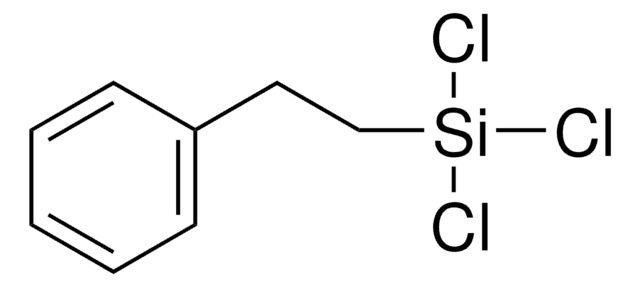104876
Trichlorovinylsilane
97%
Synonym(s):
(Trichlorosilyl)ethylene, Vinyltrichlorosilane
About This Item
Recommended Products
vapor density
>1 (vs air)
Quality Level
vapor pressure
60 mmHg ( 23 °C)
Assay
97%
refractive index
n20/D 1.436 (lit.)
bp
90 °C (lit.)
mp
−95 °C (lit.)
density
1.27 g/mL at 25 °C (lit.)
storage temp.
2-8°C
SMILES string
Cl[Si](Cl)(Cl)C=C
InChI
1S/C2H3Cl3Si/c1-2-6(3,4)5/h2H,1H2
InChI key
GQIUQDDJKHLHTB-UHFFFAOYSA-N
Looking for similar products? Visit Product Comparison Guide
General description
Application
Signal Word
Danger
Hazard Statements
Precautionary Statements
Hazard Classifications
Acute Tox. 3 Dermal - Acute Tox. 3 Inhalation - Acute Tox. 4 Oral - Eye Dam. 1 - Flam. Liq. 2 - Skin Corr. 1A
Storage Class Code
3 - Flammable liquids
WGK
WGK 1
Flash Point(F)
50.0 °F - closed cup
Flash Point(C)
10 °C - closed cup
Personal Protective Equipment
Choose from one of the most recent versions:
Already Own This Product?
Find documentation for the products that you have recently purchased in the Document Library.
Customers Also Viewed
Our team of scientists has experience in all areas of research including Life Science, Material Science, Chemical Synthesis, Chromatography, Analytical and many others.
Contact Technical Service
















